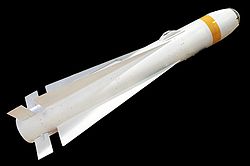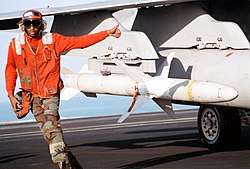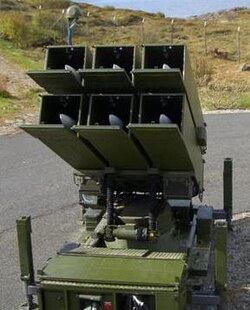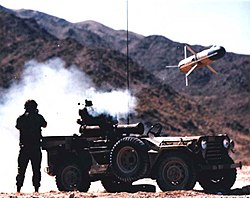The following is a list of active missiles of the United States military .
Contents
- Air-to-air missiles
- Air-to-surface missiles
- Surface-to-air
- Surface-to-surface missiles
- Antisubmarine warfare
- ICBM
- Submarine-launched
- See also
The following is a list of active missiles of the United States military .
| Missile | Guidance | Speed | Image |
|---|---|---|---|
| Air-to-Air Stinger | Infrared homing | Mach 2.2 |  |
| AIM-7 Sparrow | Semi-active radar homing | Mach 4 |  |
| AIM-9 Sidewinder | Infrared homing | Unverified (≈Mach 2.7) |  |
| AIM-120 AMRAAM | Active radar homing | Mach 4 |  |
| AIM-174B Gunslinger | Active radar homing and semi-active radar homing | Mach 3.5 |  |
| Missile | Guidance | Speed | Image |
|---|---|---|---|
| AGM-65 Maverick | Infrared homing (AGM-65D/G/F) Semi-active laser homing (AGM-65E) Charge-coupled device (AGM-65H/K) | Mach 0.93 |  |
| AGM-88 HARM | Radiation homing | Mach 1.9 |  |
| AGM-158 JASSM | Global Positioning System | Subsonic |  |
| AGM-84 Harpoon | Active radar homing | Mach 0.72 |  |
| AGM-114 Hellfire | Semi-active laser homing (AGM-114K/M/N/P/R) Active radar homing (AGM-114L) | Mach 1.3 |  |
| AGM-86 ALCM | Global Positioning System | Subsonic |  |
| AGM-158C LRASM | Global Positioning System | High Subsonic |  |
| Missile | Guidance | Speed | Image | |
|---|---|---|---|---|
| RIM-7 Sea Sparrow | Semi-active radar homing | Mach 4 |  | |
| RIM-66 Standard | Command midcourse and Terminal Semi-active radar homing | Mach 3.5 | | |
| FIM-92 Stinger | Infrared homing | Mach 2.54 |  | |
| MIM-104 Patriot | Command midcourse and Terminal Semi-active radar homing | Mach 5 |  | |
| RIM-116 Rolling Airframe Missile | Infrared homing | Mach 2.5 |  | |
| RIM-156A Standard | Command midcourse and Terminal Semi-active radar homing | Unverified (classified) |  | |
| RIM-161 Standard Missile 3 | GPS/INS/semi-active radar homing/passive LWIR infrared homing seeker (KW) | Unverified (≈Mach 9+) |  | |
| RIM-162 Evolved Sea Sparrow | Command midcourse and Terminal Semi-active radar homing | Mach 4 |  | |
| RIM-174 Standard ERAM | Command midcourse and Terminal Active radar homing | Unverified (≈Mach 3.5) |  | |
| NASAMS (Used to protect high-value targets and Washington, D.C.) | Active radar homing | Mach 4 |  |
| Missile | Guidance | Speed | Image |
|---|---|---|---|
| FGM-148 Javelin | Infrared homing | Mach 0.32 |  |
| BGM-71 TOW | Wire-guided | Mach 0.8 |  |
| BGM-109 Tomahawk | Global Positioning System aided TERCOM | Mach 0.7 |  |
| RGM-84 Harpoon | Active radar homing | Mach 0.7 |  |
| MGM-140 ATACMS | GPS-aided inertial navigation guidance | Mach 3 | |
| LRHW | - | Mach 7 |  |
| Missile | Guidance | Speed | Image |
|---|---|---|---|
| RUM-139 VL-ASROC | Inertial navigation system | Subsonic |  |
| Missile | Guidance | Speed | Image |
|---|---|---|---|
| LGM-30 Minuteman | Inertial navigation system GPS | ≈Mach 23 |  |
| Missile | Guidance | Speed | |
|---|---|---|---|
| UGM-133 Trident II | Global Positioning System | Mach 24 |  |
| UGM-109 Tomahawk | Global Positioning System | Mach 0.7 |  |
| UGM-84 Harpoon | Active radar homing | Mach 0.7 |  |